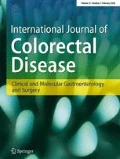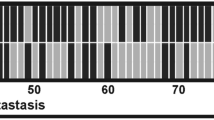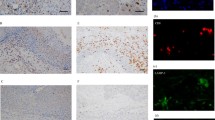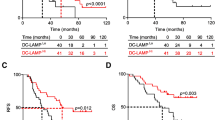Abstract
Purpose
The dendritic cells (DCs) are key players in the initiation and regulation of immune responses including antitumor immunity. In the current study, we aimed to elucidate the role of different subtypes of DCs infiltrating the tumor stroma and invasive margin for tumor progression and survival of patients with colon cancer.
Methods
The presence of immature (CD1a- and S100 protein+) and mature (CD83- and HLA-DR+) DCs was evaluated by immunohistochemistry in tissue samples from 145 patients with colon cancer. Patients were dichotomized according to the number of DCs in the tumor stroma and invasive margin, and clinical, histological, and survival data were compared between the two groups of patients.
Results
The number of the mature CD83+ DCs in the tumor stroma and in the invasive margin significantly correlated with the tumor stage: the lower level of infiltration was found in patients that have advanced tumor stage. The frequency of distant metastases was higher in patients who had lower numbers of immature CD1a+ DCs in tumor stroma and of CD83+ DCs in invasive margin. Patients showing a relatively high number of S100+ DCs in the tumor stroma and HLA-DR+ DCs in the invasive margin had a longer overall survival (p < 0.05). Patients with lower CD83+ DCs infiltration in invasive margin had worse prognosis after surgical therapy compared with those with higher CD83+ DCs infiltration (p = 0.0397).
Conclusions
Our results demonstrate that the infiltration of colon cancer with DCs is related with tumor progression and patient prognosis, suggesting a central role for DCs in controlling local antitumor immunity.


Similar content being viewed by others
References
Rutella S, Lemoli RM (2004) Regulatory T cells and tolerogenic dendritic cells: from basic biology to clinical applications. Immunol Lett 94:11–26
Cui G, Yuan A, Goll R, Olsen T, Husebekk A, Vonen B, Florholmen J (2007) Distinct changes of dendritic cell number and IL-12 mRNA level in adjacent mucosa throughout the colorectal adenoma-carcinoma sequence. Cancer Immunol Immunother 56:1993–2001
Miyagawa S, Soeda J, Takagi S, Miwa S, Ichikawa E, Terumasa N (2004) Prognostic significance of mature dendritic cells and factors associated with their accumulation in metastatic liver tumors from colorectal cancer. Hum Pathol 35:1392–1396
Perez L, Shurin MR, Collins B, Kogan D, Tourkova IL, Shurin GV (2005) Comparative analysis of CD1a, S-100, CD83, and CD11c human dendritic cells in normal, premalignant, and malignant tissues. Histol Histopathol 20:1165–1172
Hart DNJ (1997) Dendritic cells: unique leukocyte populations which control the primary immune response. Blood 90:3245–3287
Lutz MB, Schuler G (2002) Immature, semi-mature and fully mature dendritic cells: which signals induce tolerance or immunity? Trends Immunol 23:445–449
Steinman RM, Dhodapkar M (2001) Active immunization against cancer with dendritic cells: the near future. Int J Cancer 94:459–473
Shurin MR, Shurin GV, Lokshin A, Yurkovetsky ZR, Gutkin DW, Chatta G, Zhong H, Han B, Ferris RL (2006) Intratumoral cytokines/chemokines/growth factors and tumor infiltrating dendritic cells: friends or enemies? Cancer Metastasis Rev 25:333–356
Yuan A, Steigen SE, Goll R, Vonen B, Husbekk A, Cui G, Florholmen J (2008) Dendritic cell infiltration pattern along the colorectal adenoma-carcinoma sequence. APMIS 116:445–456
Wang J, Zhang X, Thomas SM, Grandis JR, Wells A, Chen ZG et al (2005) Chemokine receptor 7 activates phosphoinositide-3 kinase-mediated invasive and prosurvival pathways in head and neck cancer cells independent of EGFR. Oncogene 24:5897–5904
Gianotti L, Sargenti M, Galbiati F, Nespoli L, Brivio F, Rescigno M, Nespoli (2008) Phenotype and function of dendritic cells and T-lymphocyte polarization in the Human colonic mucosa and adenocarcinoma. Eur J Surg Oncol 34:883–889
Sandel MH, Dadabayev AR, Menon AG, Morreau H, Melief CJ, Offringa R, van der Burg SH, Janssen-van Rhijn CM, Ensink NG, Tollenaar RA, van de Velde CJ, Kuppen PJ (2005) Prognostic value of tumor-infiltrating dendritic cells in colorectal cancer: role of maturation status and intratumoral localization. Clin Cancer Res 7:2576–2582
Dadabayev AR, Sandel MH, Menon AG, Morreau H, Melief CJ, Offringa R, van der Burg SH, Janssen-van Rhijn C, Ensink NG, Tollenaar RA, van de Velde CJ, Kuppen PJ (2004) Dendritic cells in colorectal cancer correlate with other tumor-infiltrating immune cells. Cancer Immunol Immunother 11:978–986
Nagorsen D, Voigt S, Berg E, Stein H, Thiel E, Loddenkemper C (2007) Tumor-infiltrating macrophages and dendritic cells in human colorectal cancer: relation to local regulatory T cells, systemic T-cell response against tumor-associated antigens and survival. J Transl Med 5:62
Suzuki A, Masuda A, Nagata H, Kameoka S, Kikawada Y, Yamakawa M, Kasajima T (2002) Mature dendritic cells make clusters with T cells in the invasive margin of colorectal carcinoma. J Pathol 1:37–43
Ishigami S, Ueno S, Matsumoto M, Okumura H, Arigami T, Uchikado Y, Setoyama T, Arima H, Sasaki K, Kitazono M, Shinchi H, Kijima Y, Natsugoe S (2010) Prognostic value of CD208-positive cell infiltration in gastric cancer. Cancer Immunol Immunother 3:389–395
Furihata M, Ohtsuki Y, Ido E, Iwata J, Sonobe H, Araki K, Ogoshi S, Ohmori K (1992) HLA-DR antigen- and S-100 protein-positive dendritic cells in esophageal squamous cell carcinoma—their distribution in relation to prognosis. Virchows Arch B Cell Pathol Incl Mol Pathol 6:409–414
UICC (2002) In: Sobin LH, Wittekind Ch (eds) TNM classification of malignant tumours, 6th edn. Wiley, New York
Kioshima T, Kobayashi I, Matsuo K, Ishibashi Y, Miyoshi A, Akashi Y, Sakai H (1998) Immunohistochemical localization of laminin, collagen type IV and heparan sulfate proteoglycan in human colorectal adenocarcinoma: correlation with local invasive pattern and lymph node metastasis. Acta Histochem Cytoc 31:39–47
Gulubova M, Vlaykova T (2006) Immunohistochemical assessment of fibronectin and tenascin and their integrin receptors alpha5beta1 and alpha9beta1 in gastric and colorectal cancers with lymph node and liver metastases. Acta Histochem 108:25–35
Gulubova M, Vlaykova T (2009) Prognostic significance of mast cell number and microvascular density for the survival of patients with primary colorectal cancer. J Gastroenterol Hepatol 24(7):1265–1275
André T, Boni C, Mounedji-Boudiaf L, Navarro M, Tabernero J, Hickish T, Topham C, Zaninelli M, Clingan P, Bridgewater J, Tabah-Fisch I, de Gramont A, Multicenter International Study of Oxaliplatin/5-Fluorouracil/Leucovorin in the Adjuvant Treatment of Colon Cancer (MOSAIC) Investigators (2004) Oxaliplatin, fluorouracil, and leucovorin as adjuvant treatment for colon cancer. N Engl J Med 350(23):2343–2351
Iwamoto M, Shinohara H, Miyamoto A, Okuzawa M, Mabuchi H, Nohara T, Gon G, Toyoda M, Tanigawa N (2003) Prognostic value of tumor-infiltrating dendritic cells expressing CD83 in human breast carcinomas. Int J Cancer 1:92–97
Zhou LJ, Tedder TF (1995) A distinct pattern of cytokine gene expression by human CD83+ blood dendritic cells. Blood 9:3295–3301
Björck P, Flores-Romo L, Liu YJ (1997) Human interdigitating dendritic cells directly stimulate CD40-activated naive B cells. Eur J Immunol 5:1266–1274
Caux C, Massacrier C, Vanbervliet B, Dubois B, de Saint-Vis B, Dezutter-Dambuyant C, Jacquet C, Schmitt D, Banchereau J (1997) CD34+ hematopoietic progenitors from human cord blood differentiate along two independent dendritic cell pathways in response to GM-CSF + TNF alpha. Adv Exp Med 417:21–25
Troy A, Davidson P, Atkinson C, Hart D (1998) Phenotypic characterisation of the dendritic cell infiltrate in prostate cancer. J Urol 1:214–219
Koido S, Hara E, Homma S, Fujise K, Gong J, Tajiri H (2007) Dendritic/tumor fusion cell-based vaccination against cancer. Arch Immunol Ther Exp (Warsz) 5:281–287
Zavala WD, De Simone DS, Sacerdote FL, Cavicchia JC (2002) Variation in Langerhans cell number and morphology between the upper and lower regions of the human esophageal epithelium. Anat Rec 4:360–364
Schwaab T, Weiss JE, Schned AR, Barth RJ Jr (2001) Dendritic cell infiltration in colon cancer. J Immunother 24(2):130–137
Zhang JK, Li J, Chen HB, Sun JL, Qu YJ, Lu JJ (2002) Antitumor activities of human dendritic cells derived from peripheral and cord blood. World J Gastroenterol 1:87–90
Xie Z-J, Jia L-M, He Y-C, Gao J-T (2006) Morphological observation of tumor infiltrating immunocytes in human rectal cancer. World J Gastroenterol 11:1757–1760
Wright-Browne V, McClain KL, Talpaz M, Ordonez N, Estrov Z (1997) Physiology and pathophysiology of dendritic cells. Hum Pathol 5:563–579
Kikuchi K, Kusama K, Taguchi K, Ishikawa F, Okamoto M, Shimada J, Sakashita H, Yamamo Y (2002) Dendritic cells in human squamous cell carcinoma of the oral cavity. Anticancer Res 2A:545–557
Sikorska B, Danilewicz M, Wagrowska-Danilewicz M (1999) HLA-DR expression is a significant prognostic factor in laryngeal cancer. A morphometric study. APMIS 4:383–388
Saito H, Tsujitani S, Ikeguchi M, Maeta M, Kaibara N (1998) Relationship between the expression of vascular endothelial growth factor and the density of dendritic cells in gastric adenocarcinoma tissue. Br J Cancer 12:1573–1577
Author information
Authors and Affiliations
Corresponding author
Rights and permissions
About this article
Cite this article
Gulubova, M.V., Ananiev, J.R., Vlaykova, T.I. et al. Role of dendritic cells in progression and clinical outcome of colon cancer. Int J Colorectal Dis 27, 159–169 (2012). https://doi.org/10.1007/s00384-011-1334-1
Accepted:
Published:
Issue Date:
DOI: https://doi.org/10.1007/s00384-011-1334-1




